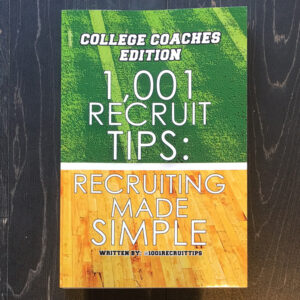One of the biggest difference-makers in recruiting is organization as a staff, you can quickly get overwhelmed and running in 50 different directions without a system. Organization and consistency will help you get through stressful times, your day-by-day job is unpredictable, so being organized and prepared for anything that you can takes the pressure off you for the unplanned chaos that comes up!
It is important that you are professional with everyone you work with- prospects, parents, coaches, internal support staff, university staff, vendors—and one of the biggest aspects of being professional is being organized. Strive to prepare for each event with every perspective in mind. You should be at a point where you are organized enough to be looking a month ahead (or more) for every event you manage.
Key data (cell phone numbers and email addresses) need to be easily accessible for all prospects, parents and high school coaches 24/7! You need to have immediate access to this information at a moment’s notice as your head coach will come into your office and want to jump on a call now – be prepared!
• ASSISTANT COACH SUPPORT: For coaches to do their job efficiently, a support staff that can help streamline, organize, prepare and manage non-coaching details is essential. A great head coach has assistant coaches who are prepared, and to put assistant coaches in a great position, you need a great support staff, grad assistants, interns, managers and gameday volunteers. In-season operations, evaluation periods, camps and Official/Unofficial Visit events are of utmost importance to coaches, therefore it’s a game changer to have a strong support staff that can streamline procedures. The goal of your support staff is to handle responsibilities that can be taken off the plates of assistant coaches, freeing them up to make more phone calls, visits or to spend more time on gameplans, relationships with players and practice preparations.
• DATABASE: The prospect and prep coaches databases need to be proofed continuously with limited access granted to select staff. It is important that information is pooled for everyone’s use and that it is correct- prospect names, addresses, phone numbers, coach’s info. When too many people have hands in editing the database, it can be tough to manage. In most cases, it’s better to only have a couple people update new addresses, phone numbers, etc.
When making updates to the database, keep the handwritten notes of addresses or phone numbers in a drawer or file. Typos are common, store those original copies somewhere in case you need to look back on them!
When gathering prospect information you may run across multiple spellings of first and last names, ask their head coach or ask the prospect directly. Have a point person in charge of confirming the correct spellings of your prospects names and prep coaches, via the internet and social media, or by making phone calls if unsure. Misspellings are insulting!
• ACADEMICS: Admissions information, as well as specific college and major booklets, needs to be on hand, as well as contacts established within each department. As recruiters, you need to show that you know as much about academics as you do your sport. All university admittance and academic policies need to be understood and easily recited. Every coach needs to understand University GPA and test score standards without having to look them up.
• ATHLETIC DEPARTMENT AND UNIVERSITY CONTACTS: Communication is key between your team’s support staff and contacts within the Athletic Department and the University. You are working with other departments and non-athletics staff at times, give them as much preparation time and advanced notice that you can, and remember to be appreciative of their assistance. Don’t expect them to drop everything they’re doing to help you, especially consistently.
BOOK: Order ‘Recruiting Made Simple’ with hundreds of recruiting tips for college coaches!
• EVENTS: Events need to be thoroughly planned out to eliminate as many kinks as possible. Every procedure needs to be simplified and smooth, recruiting events will be held year-round, so you need to develop a streamlined system. Constantly evaluate ways to simplify your procedures. Ask the external groups that you work with for input on ways to improve.
Set dates early for Junior/Sophomore Days, group Unofficial Visit weekends, Official Visit weekends, camps and clinics. When you pick dates early, you can begin setting up all the operational details and begin inviting players, coaches and parents.
Have an operations coordinator manage event logistics or assign individual responsibilities among the coaching staff for housing, meals, venue reservations, security, Compliance approvals, gear, check-in, payment processes, staffing schedules, intern assistance, etc.
• CALENDAR: Put together a detailed calendar that is complete with important high school and University dates, and dates important within your season, conference, and sport. Be looking a month ahead and find ways that you can connect with all of your audiences: pre-season, conference season, post-season, first day of class, final exams, Prom, Super Bowl, NFL combine, AAU tourneys, graduation, holidays. Know what is coming up in the next few weeks!
Sit down with your Compliance Office to be aware of all paperwork you must submit regarding evaluations, recruiting travel, phone logs, visitors on campus to make paperwork easier to complete. Keep a very detailed calendar listing evaluations, traveling, phone calls.
• EVALUATION DAYS: The NCAA limits coaches to a certain number of in-person evaluations, limits vary by sport. A central person needs to maintain these logs of dates, locations, prospects seen and coaches from your staff in attendance. You may have to plan out your evaluations to not exceed these limits, as well as the total number of days on the road recruiting. Organization is essential for keeping track of evaluation days.
It’s time-consuming to have to go back and research your moves from weeks or months ago. Develop a system or file to track all necessary Compliance information as you go.
• BUSINESS OFFICE: Get to know reimbursement policies and spending allowances/per diems ahead of time. All schools vary with their travel policies for hotels, flights and meals. Develop a system to keep all receipts, hotel bills, flight reservations, meals, tolls, mileage, etc. You can quickly run up thousands of dollars in bills and some universities are quite picky about reimbursement policies and spending allowances. You don’t want to end up paying for expenses personally—which can happen if you don’t follow University policy! Ask other coaches in the Athletic Department how long it takes for reimbursements to be processed, and if there are other landmines to look out for.
• CORRESPONDENCE: A flowchart of communication needs to be developed for solicited and unsolicited correspondence (calls, mail, email, DVDs) so each inquiry will receive a response from your program, either via mail or email.
• CORRECT SPELLING: Spell names correctly! Between the internet, combine reports, AAU packets… even the simplest names can have multiple spellings from your reports. When gathering info, be sure to ask prep coaches for correct name spellings for players, parents and coaches. Although it may seem like a minor detail, an easy error to mistake a y for an i, for a typo to happen when entering hundreds of prospects into the database. As you scoff when you are wrongly addressed or your name is mispronounced, understand kids and parents do too! Take the extra time to make sure your prospects’ names are spelled correctly!
• TRANSCRIPTS: Keep a file cabinet or binder for all transcripts gathered, either by staff or for yourself. Create a file for each prospect in a central location or organize on your own in alphabetical order. Transcripts are needed for Official Visits and a variety of reasons, depending on the campus. Be sure that transcripts are immediately returned to the cabinet after use, or that you make a copy before giving to someone on staff to review.





